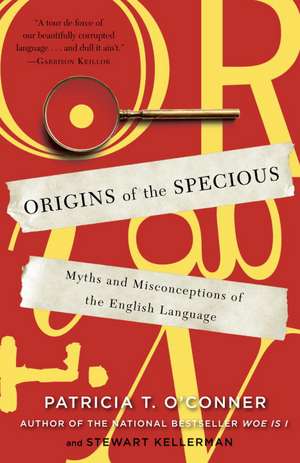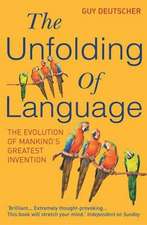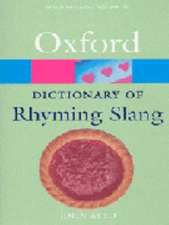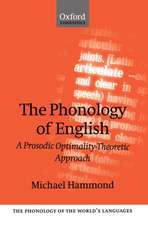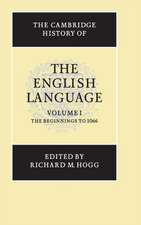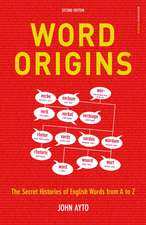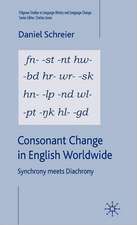Origins of the Specious: Myths and Misconceptions of the English Language
Autor Patricia T. O'Conner, Stewart Kellermanen Limba Engleză Paperback – 31 iul 2010
In Origins of the Specious, word mavens Patricia T. O’Conner and Stewart Kellerman reveal why some of grammar’s best-known “rules” aren’t—and never were—rules at all. This playfully witty, rigorously researched book sets the record straight about bogus word origins, politically correct fictions, phony français, fake acronyms, and more. Here are some shockers: “They” was once commonly used for both singular and plural, much the way “you” is today. And an eighteenth-century female grammarian, of all people, is largely responsible for the all-purpose “he.” From the Queen’s English to street slang, this eye-opening romp will be the toast of grammarphiles and the salvation of grammarphobes. Take our word for it.
Preț: 105.82 lei
Nou
Puncte Express: 159
Preț estimativ în valută:
20.25€ • 21.19$ • 16.85£
20.25€ • 21.19$ • 16.85£
Carte disponibilă
Livrare economică 10-24 martie
Preluare comenzi: 021 569.72.76
Specificații
ISBN-13: 9780812978100
ISBN-10: 0812978102
Pagini: 266
Dimensiuni: 133 x 206 x 17 mm
Greutate: 0.21 kg
Editura: Random House Trade
ISBN-10: 0812978102
Pagini: 266
Dimensiuni: 133 x 206 x 17 mm
Greutate: 0.21 kg
Editura: Random House Trade
Notă biografică
Patricia T. O’Conner, a former editor at The New York Times Book Review, has written four books on language and writing–the bestselling Woe Is I: The Grammarphobe’s Guide to Better English in Plain English; Words Fail Me: What Everyone Who Writes Should Know About Writing; Woe Is I Jr.: The Younger Grammarphobe’s Guide to Better English in Plain English; and You Send Me: Getting It Right When You Write Online.
Stewart Kellerman has been an editor at The New York Times and a foreign correspondent for UPI in Asia, Latin America, and the Middle East. He co-authored You Send Me with his wife, Patricia T. O’Conner, and he runs their website and blog at grammarphobia.com. They live in rural Connecticut.
From the Hardcover edition.
Stewart Kellerman has been an editor at The New York Times and a foreign correspondent for UPI in Asia, Latin America, and the Middle East. He co-authored You Send Me with his wife, Patricia T. O’Conner, and he runs their website and blog at grammarphobia.com. They live in rural Connecticut.
From the Hardcover edition.
Extras
Chapter One
Stiff Upper Lips
Why Can’t the British Be More Like Us?
Winston Churchill gave the folks at Bartlett’s plenty of fodder for their books of Familiar Quotations: “so much owed by so many to so few” . . . “blood, toil, tears, and sweat” . . . “this was their finest hour” . . . and more. But he didn’t describe England and America as “two nations divided by a common language,” though thousands of websites say so. What he did, though, was pass along a great story about how the two nations were indeed divided by their two Englishes at a meeting of Allied leaders during World War II.
“The enjoyment of a common language was of course a supreme advantage in all British and American discussions,” Churchill wrote in The Second World War. No interpreters were needed, for one thing, but there were “differences of expression, which in the early days led to an amusing incident.” The British wanted to raise an urgent matter, he said, and told the Americans they wished to “table it” (that is, bring it to the table). But to the Americans, tabling something meant putting it aside. “A long and even acrimonious argument ensued,” Churchill wrote, “before both parties realised that they were agreed on the merits and wanted the same thing.”
I’m no mind reader, but I’ll bet the Brits at the table felt their English was the real thing, while the Yanks felt apologetic about theirs. If there’s one thing our two peoples agree on, it’s that British English is purer than its American offshoot. My in-box gets pinged every week or two by a Brit with his knickers in a twist or an American with an inferiority complex. A typical comment: “Why do you refer to ‘American English’ and ‘British English’ Surely it should be ‘American English’ and ‘proper English.’” Ouch! Is their English really more proper—that is, purer—than ours? Which one is more like the English spoken in the 1600s when the Colonies and the mother country began diverging linguistically?
First of all, “American English” and “British English” are how authorities refer to the two major branches of English, and reflect the changes in the language since the Colonies separated themselves linguistically from England. The differences are many, but they’re minor from a grammarian’s point of view. Most have to do with spelling, pronunciation, and usage. En?glish grammar is English grammar no matter where you live, despite a few exceptions here and there.
The truth is that neither English is more proper. In some respects American English is purer than British English: We’ve preserved some usages and spellings and pronunciations that have changed over time in Britain. But the reverse is also true. The British have preserved much that has changed on our side of the Atlantic. In many cases, it’s nearly impossible to tell which branch has history on its side. Take “table,” the word that gave those Allied leaders such grief. In the eighteenth century, the phrase “to lay on the table” could mean either to bring up or to defer. By the nineteenth century, the Brits had preserved one of those meanings and the Yanks the other. So the verb “table” meant one thing there and quite another here.
In case you’re wondering who should get the credit for that crack about “two nations divided by a common language,” the answer is nobody exactly. George Bernard Shaw was quoted in 1942 as saying, “England and America are two countries separated by the same language.” But nobody is certain where or when he said it. What we do know is that Oscar Wilde said the same thing in different words in 1887: “We have really everything in common with America nowadays, except, of course, language.”
Sound Bites
We’ve all seen My Fair Lady, on stage or screen or iPod or whatever, and we all have our favorite scenes. One of mine is the bit where Henry Higgins, the arrogant professor of phonetics, first encounters the flower girl Eliza Doolittle at Covent Garden and is appalled by her Cockney accent. Higgins belittles her for turning the language of Shakespeare and Milton into “such disgusting and depressing noise,” and she screeches, “Ah-ah-aw-aw-
oo-oo.” Fed up with her “detestable boo-hooing,” he sings, “Why can’t the English learn to speak?”
So what would a real Professor Higgins make of the way Americans speak? We don’t have to look hard to find the answer, and many apologetic Americans may be surprised to hear it. Professor William A. Read, a distinguished linguist, put it this way in a journal of philology: “The pronunciation of educated Americans is in many respects more archaic than that of educated Englishmen.” This should be no surprise, he said, since “the phonetic basis of American pronunciation rests chiefly on the speech of Englishmen of the seventeenth and eighteenth centuries.” And those Englishmen sounded much like the Americans of today. The “English accent” that we now associate with educated British speech is a relatively new phenomenon and ?didn’t develop until after the American Revolution.
Look at the way the letter r is pronounced (or not pronounced), perhaps the most important difference in the speech of educated people in the US and the UK. Since Anglo-Saxon days, the English had pronounced the r in words like “far,” “mother,” “world,” “church,” and “mourn.” English speakers on both sides of the Atlantic pronounced the r’s in these words when the Colonies broke away from England. Most Americans still do. But educated people in Britain began dropping their r’s in the late eighteenth and early nineteenth centuries. The Americans most likely to drop their r’s were those, like New Englanders, who had strong commercial and social ties with the mother country.
This dropping of r’s in Britain ?didn’t happen all of a sudden, and the sticklers of the day ?didn’t take it lying down. “The perception that the language was ‘losing a letter’ was a cause of profound upset to some writers,” the linguist David Crystal has written. The poet Keats, for example, was cruelly upbraided by critics for rhyming “thoughts” with “sorts,” and “thorns” with “fawns.” Lord Byron blamed a critical article for hastening Keats’s death in 1821: “’Tis strange the mind, that very fiery particle, / Should let itself be snuffed out by an Article.” But by the time Keats died, the dropped r was a standard feature of educated British pronunciation.
The other letter that’s a dead giveaway in telling a Brit from a Yank is the a in a word like “past.” We all know how an American would say it—with an a like the one in “cat.” And as anyone who’s watched Masterpiece Theatre can tell you, the standard British pronunciation is PAHST. But it wasn’t always so. The Brits used to say it the same way Americans do now. Here again, the Americans stuck with an old way of speaking, one the British abandoned about the same time they dropped their r’s.
The a, like the r, has ping-ponged in British pronunciation. Until the 1500s, the English did indeed pronounce words like “bath” and “laugh” and “dance” with an “ah.” But in the sixteenth century they began pronouncing the a in what we now consider the American way (as in “cat”). So things remained for the next two or three hundred years. This is the a that went to America on the Mayflower in 1620. And this is the a that both the Redcoats and the Colonists used during the Revolutionary War. Not until the 1780s did Londoners begin pronouncing their a’s like “ahs” again, and for a few decades the broad a and the short a battled it out. But by the early 1800s, educated Britain was saying BAHTH and LAHF and DAHNCE.
That’s also about when literate Britons started pronouncing the h in “herb.” Before the nineteenth century, both the English and Americans pronounced it ERB. In fact, the word was usually spelled “erbe” for the first few hundred years after it was borrowed from the Old French erbe in the 1200s. The h was added later as a nod to the Latin original (herba, or grass), but the letter was silent. Today, Americans pronounce “herb” the way Shakespeare did, with a silent h, while the Bard wouldn’t recognize the word in the mouths of the English.
Speaking of aitches, some British speakers, especially on the telly, use “an” before words like “historic” or “hotel,” and some Anglophiles over here are slavishly imitating them. For shame! Usage manuals on both sides of the Atlantic say the article to use is “a,” not “an.” The rule is that we use “a” before a word that begins with an h that’s pronounced and “an” before a word that starts with a silent h. And dictionaries in both Britain and the United States say the h should be pronounced in “historic” and “hotel” as well as “heroic,” “habitual,” “hypothesis,” “horrendous,” and some other problem h-words.
When the British aren’t adding or subtracting an h, stretching out an a, or dropping an r, they’re chopping off whole syllables from words like “secretary,” “necessary,” “military,” “extraordinary,” “satisfactory,” “literary,” and others. “Secretary,” for example, is shortened to SEC-ruh-tree, cutting off the next-to-last syllable. Americans, on the other hand, pronounce all four syllables ?(SEC-ruh- teh-ree), as the British did until the eighteenth century. We know this because British textbooks of the time recommended pronouncing all the syllables. But by 1780, the British educator Thomas Sheridan was complaining about people who spoke too quickly and dropped syllables, leading to “indistinct articulation.” In A General Dictionary of the English Language, Sheridan suggested that the guilty parties “pronounce the unaccented syllables more fully than necessary, till they are cured of it.” The cure ?didn’t work. If it had, the British would be saying “necessary” today as Americans do, instead of NESS-uh-sree. No doubt Sheridan would have found that satisfactory.
Back to the Future
Prince Charles’s mom may be the queen of England, but he has a lot to learn about the Queen’s English. In 1995, the prince complained that Americans were corrupting the English language. In a speech to the British Council, an institution that promotes British culture and the English language, Charles said Americans “tend to invent all sorts of nouns and verbs and make words that shouldn’t be.” If the English don’t protect their language, he said, “the whole thing can get rather a mess.”
“We must act now to insure that English—and that, to my mind, means English English—maintains its position as the world language well into the next century,” he said.
Balderdash. And no, we didn’t invent that one. Both Britons and Americans have invented all sorts of words since the two languages went their own ways a few hundred years ago. (We rub out mistakes with an “eraser” while they use a “rubber”; we stow a spare “tire” in the “trunk” and they keep a “tyre” in the “boot”; we take the “elevator” and they use the “lift.”) But many of the words that Anglo- purists like Prince Charles condemn us for are actually words that we’ve preserved from the English spoken in the 1600s and 1700s, before the Great Divide.
Let’s look at the two English words for the season when leaves turn, wheat is harvested, and the days get shorter. Americans call it “fall” or “autumn.” The British call it “autumn” and think “fall” is a Yankee eccentricity. The truth is that we all once had two words, but the British lost one along the way while Americans preserved them both. Interestingly, the Brits discarded the Anglo-Saxon one and kept the one they got from the French. The word “fall” has been part of English since the reign of King Alfred the Great in the ninth century, though it wasn’t used for the season until the sixteenth century. It made its eloquent debut in a 1545 book on archery: “Spring tyme, Somer, faule of the leafe, and winter.” The word “autumn,” on the other hand, was borrowed in the fourteenth century from Old French, which got it from the Latin autumnus.
To the Londoner who lives in a “flat,” the word “apartment” sounds like an Americanism, and a clunky one at that. But “apartment” was the usual word for a suite of rooms in ?seventeenth-century England, and that’s the word the Colonists brought with them. The British ? didn’t start using “flat” for a dwelling until the 1820s or so. By the end of the nineteenth century, the lease was up on “apartment.”
Another so-called Americanism is the use of “mad” to mean angry. To the British “mad” means insane, and any other usage is crazy. But this is one more example of Yankee preservation. The word “mad” had been used in Britain since the fourteenth century to mean both insane and angry. Americans kept both meanings, but British usage guides dropped one in the late eighteenth century.
Americans have saved many, many other words that the En?glish have lost. We both used “druggist” in the 1600s. Americans still do (as do the Scots), but the English began switching to “chemist” in the eighteenth century. Both of us once walked on a “sidewalk” or a “pavement,” but Americans now tread on one and the British on the other.
We all used to cook on a “stove” or a “range,” and Americans still do, but the British decided in the nineteenth century to make their bangers and mash on a “cooker.” And at one time, we both used a “skillet” as well as a “frying pan.” We kept the two of them, but the British threw out the “skillet.” Is your head spinning? Then how about this one: Our kids take rides on a “merry-go-round,” while theirs go on a “roundabout.” Which is older? The newer one is just a roundabout way of saying ?“merry-go-round.”
Noah and the Flood
Why does an ill-humored American hypochondriac eat lots of fiber and dramatize his aches and pains, while (or, rather, whilst) his ill- humoured British counterpart wolfs down the fibre and dramatises? We can largely blame two cranky old men—Noah Webster and Samuel Johnson— for this state of affairs.
Many of the words that are now spelled one way here and another there had multiple spellings once upon a time. When the two lexicographers wrote their influential dictionaries, Webster chose one and Johnson another. But the story isn’t as simple as that. Johnson adopted many Frenchified spellings that had been introduced in Britain in the eighteenth century. But Webster often stuck with older spellings, the ones the Colonists had brought from England in the seventeenth century.
From the Hardcover edition.
Stiff Upper Lips
Why Can’t the British Be More Like Us?
Winston Churchill gave the folks at Bartlett’s plenty of fodder for their books of Familiar Quotations: “so much owed by so many to so few” . . . “blood, toil, tears, and sweat” . . . “this was their finest hour” . . . and more. But he didn’t describe England and America as “two nations divided by a common language,” though thousands of websites say so. What he did, though, was pass along a great story about how the two nations were indeed divided by their two Englishes at a meeting of Allied leaders during World War II.
“The enjoyment of a common language was of course a supreme advantage in all British and American discussions,” Churchill wrote in The Second World War. No interpreters were needed, for one thing, but there were “differences of expression, which in the early days led to an amusing incident.” The British wanted to raise an urgent matter, he said, and told the Americans they wished to “table it” (that is, bring it to the table). But to the Americans, tabling something meant putting it aside. “A long and even acrimonious argument ensued,” Churchill wrote, “before both parties realised that they were agreed on the merits and wanted the same thing.”
I’m no mind reader, but I’ll bet the Brits at the table felt their English was the real thing, while the Yanks felt apologetic about theirs. If there’s one thing our two peoples agree on, it’s that British English is purer than its American offshoot. My in-box gets pinged every week or two by a Brit with his knickers in a twist or an American with an inferiority complex. A typical comment: “Why do you refer to ‘American English’ and ‘British English’ Surely it should be ‘American English’ and ‘proper English.’” Ouch! Is their English really more proper—that is, purer—than ours? Which one is more like the English spoken in the 1600s when the Colonies and the mother country began diverging linguistically?
First of all, “American English” and “British English” are how authorities refer to the two major branches of English, and reflect the changes in the language since the Colonies separated themselves linguistically from England. The differences are many, but they’re minor from a grammarian’s point of view. Most have to do with spelling, pronunciation, and usage. En?glish grammar is English grammar no matter where you live, despite a few exceptions here and there.
The truth is that neither English is more proper. In some respects American English is purer than British English: We’ve preserved some usages and spellings and pronunciations that have changed over time in Britain. But the reverse is also true. The British have preserved much that has changed on our side of the Atlantic. In many cases, it’s nearly impossible to tell which branch has history on its side. Take “table,” the word that gave those Allied leaders such grief. In the eighteenth century, the phrase “to lay on the table” could mean either to bring up or to defer. By the nineteenth century, the Brits had preserved one of those meanings and the Yanks the other. So the verb “table” meant one thing there and quite another here.
In case you’re wondering who should get the credit for that crack about “two nations divided by a common language,” the answer is nobody exactly. George Bernard Shaw was quoted in 1942 as saying, “England and America are two countries separated by the same language.” But nobody is certain where or when he said it. What we do know is that Oscar Wilde said the same thing in different words in 1887: “We have really everything in common with America nowadays, except, of course, language.”
Sound Bites
We’ve all seen My Fair Lady, on stage or screen or iPod or whatever, and we all have our favorite scenes. One of mine is the bit where Henry Higgins, the arrogant professor of phonetics, first encounters the flower girl Eliza Doolittle at Covent Garden and is appalled by her Cockney accent. Higgins belittles her for turning the language of Shakespeare and Milton into “such disgusting and depressing noise,” and she screeches, “Ah-ah-aw-aw-
oo-oo.” Fed up with her “detestable boo-hooing,” he sings, “Why can’t the English learn to speak?”
So what would a real Professor Higgins make of the way Americans speak? We don’t have to look hard to find the answer, and many apologetic Americans may be surprised to hear it. Professor William A. Read, a distinguished linguist, put it this way in a journal of philology: “The pronunciation of educated Americans is in many respects more archaic than that of educated Englishmen.” This should be no surprise, he said, since “the phonetic basis of American pronunciation rests chiefly on the speech of Englishmen of the seventeenth and eighteenth centuries.” And those Englishmen sounded much like the Americans of today. The “English accent” that we now associate with educated British speech is a relatively new phenomenon and ?didn’t develop until after the American Revolution.
Look at the way the letter r is pronounced (or not pronounced), perhaps the most important difference in the speech of educated people in the US and the UK. Since Anglo-Saxon days, the English had pronounced the r in words like “far,” “mother,” “world,” “church,” and “mourn.” English speakers on both sides of the Atlantic pronounced the r’s in these words when the Colonies broke away from England. Most Americans still do. But educated people in Britain began dropping their r’s in the late eighteenth and early nineteenth centuries. The Americans most likely to drop their r’s were those, like New Englanders, who had strong commercial and social ties with the mother country.
This dropping of r’s in Britain ?didn’t happen all of a sudden, and the sticklers of the day ?didn’t take it lying down. “The perception that the language was ‘losing a letter’ was a cause of profound upset to some writers,” the linguist David Crystal has written. The poet Keats, for example, was cruelly upbraided by critics for rhyming “thoughts” with “sorts,” and “thorns” with “fawns.” Lord Byron blamed a critical article for hastening Keats’s death in 1821: “’Tis strange the mind, that very fiery particle, / Should let itself be snuffed out by an Article.” But by the time Keats died, the dropped r was a standard feature of educated British pronunciation.
The other letter that’s a dead giveaway in telling a Brit from a Yank is the a in a word like “past.” We all know how an American would say it—with an a like the one in “cat.” And as anyone who’s watched Masterpiece Theatre can tell you, the standard British pronunciation is PAHST. But it wasn’t always so. The Brits used to say it the same way Americans do now. Here again, the Americans stuck with an old way of speaking, one the British abandoned about the same time they dropped their r’s.
The a, like the r, has ping-ponged in British pronunciation. Until the 1500s, the English did indeed pronounce words like “bath” and “laugh” and “dance” with an “ah.” But in the sixteenth century they began pronouncing the a in what we now consider the American way (as in “cat”). So things remained for the next two or three hundred years. This is the a that went to America on the Mayflower in 1620. And this is the a that both the Redcoats and the Colonists used during the Revolutionary War. Not until the 1780s did Londoners begin pronouncing their a’s like “ahs” again, and for a few decades the broad a and the short a battled it out. But by the early 1800s, educated Britain was saying BAHTH and LAHF and DAHNCE.
That’s also about when literate Britons started pronouncing the h in “herb.” Before the nineteenth century, both the English and Americans pronounced it ERB. In fact, the word was usually spelled “erbe” for the first few hundred years after it was borrowed from the Old French erbe in the 1200s. The h was added later as a nod to the Latin original (herba, or grass), but the letter was silent. Today, Americans pronounce “herb” the way Shakespeare did, with a silent h, while the Bard wouldn’t recognize the word in the mouths of the English.
Speaking of aitches, some British speakers, especially on the telly, use “an” before words like “historic” or “hotel,” and some Anglophiles over here are slavishly imitating them. For shame! Usage manuals on both sides of the Atlantic say the article to use is “a,” not “an.” The rule is that we use “a” before a word that begins with an h that’s pronounced and “an” before a word that starts with a silent h. And dictionaries in both Britain and the United States say the h should be pronounced in “historic” and “hotel” as well as “heroic,” “habitual,” “hypothesis,” “horrendous,” and some other problem h-words.
When the British aren’t adding or subtracting an h, stretching out an a, or dropping an r, they’re chopping off whole syllables from words like “secretary,” “necessary,” “military,” “extraordinary,” “satisfactory,” “literary,” and others. “Secretary,” for example, is shortened to SEC-ruh-tree, cutting off the next-to-last syllable. Americans, on the other hand, pronounce all four syllables ?(SEC-ruh- teh-ree), as the British did until the eighteenth century. We know this because British textbooks of the time recommended pronouncing all the syllables. But by 1780, the British educator Thomas Sheridan was complaining about people who spoke too quickly and dropped syllables, leading to “indistinct articulation.” In A General Dictionary of the English Language, Sheridan suggested that the guilty parties “pronounce the unaccented syllables more fully than necessary, till they are cured of it.” The cure ?didn’t work. If it had, the British would be saying “necessary” today as Americans do, instead of NESS-uh-sree. No doubt Sheridan would have found that satisfactory.
Back to the Future
Prince Charles’s mom may be the queen of England, but he has a lot to learn about the Queen’s English. In 1995, the prince complained that Americans were corrupting the English language. In a speech to the British Council, an institution that promotes British culture and the English language, Charles said Americans “tend to invent all sorts of nouns and verbs and make words that shouldn’t be.” If the English don’t protect their language, he said, “the whole thing can get rather a mess.”
“We must act now to insure that English—and that, to my mind, means English English—maintains its position as the world language well into the next century,” he said.
Balderdash. And no, we didn’t invent that one. Both Britons and Americans have invented all sorts of words since the two languages went their own ways a few hundred years ago. (We rub out mistakes with an “eraser” while they use a “rubber”; we stow a spare “tire” in the “trunk” and they keep a “tyre” in the “boot”; we take the “elevator” and they use the “lift.”) But many of the words that Anglo- purists like Prince Charles condemn us for are actually words that we’ve preserved from the English spoken in the 1600s and 1700s, before the Great Divide.
Let’s look at the two English words for the season when leaves turn, wheat is harvested, and the days get shorter. Americans call it “fall” or “autumn.” The British call it “autumn” and think “fall” is a Yankee eccentricity. The truth is that we all once had two words, but the British lost one along the way while Americans preserved them both. Interestingly, the Brits discarded the Anglo-Saxon one and kept the one they got from the French. The word “fall” has been part of English since the reign of King Alfred the Great in the ninth century, though it wasn’t used for the season until the sixteenth century. It made its eloquent debut in a 1545 book on archery: “Spring tyme, Somer, faule of the leafe, and winter.” The word “autumn,” on the other hand, was borrowed in the fourteenth century from Old French, which got it from the Latin autumnus.
To the Londoner who lives in a “flat,” the word “apartment” sounds like an Americanism, and a clunky one at that. But “apartment” was the usual word for a suite of rooms in ?seventeenth-century England, and that’s the word the Colonists brought with them. The British ? didn’t start using “flat” for a dwelling until the 1820s or so. By the end of the nineteenth century, the lease was up on “apartment.”
Another so-called Americanism is the use of “mad” to mean angry. To the British “mad” means insane, and any other usage is crazy. But this is one more example of Yankee preservation. The word “mad” had been used in Britain since the fourteenth century to mean both insane and angry. Americans kept both meanings, but British usage guides dropped one in the late eighteenth century.
Americans have saved many, many other words that the En?glish have lost. We both used “druggist” in the 1600s. Americans still do (as do the Scots), but the English began switching to “chemist” in the eighteenth century. Both of us once walked on a “sidewalk” or a “pavement,” but Americans now tread on one and the British on the other.
We all used to cook on a “stove” or a “range,” and Americans still do, but the British decided in the nineteenth century to make their bangers and mash on a “cooker.” And at one time, we both used a “skillet” as well as a “frying pan.” We kept the two of them, but the British threw out the “skillet.” Is your head spinning? Then how about this one: Our kids take rides on a “merry-go-round,” while theirs go on a “roundabout.” Which is older? The newer one is just a roundabout way of saying ?“merry-go-round.”
Noah and the Flood
Why does an ill-humored American hypochondriac eat lots of fiber and dramatize his aches and pains, while (or, rather, whilst) his ill- humoured British counterpart wolfs down the fibre and dramatises? We can largely blame two cranky old men—Noah Webster and Samuel Johnson— for this state of affairs.
Many of the words that are now spelled one way here and another there had multiple spellings once upon a time. When the two lexicographers wrote their influential dictionaries, Webster chose one and Johnson another. But the story isn’t as simple as that. Johnson adopted many Frenchified spellings that had been introduced in Britain in the eighteenth century. But Webster often stuck with older spellings, the ones the Colonists had brought from England in the seventeenth century.
From the Hardcover edition.
Recenzii
"Every bartender in the land should have a copy of this vastly amusing and highly informative book. Then when some tipsy bore declares that posh derives from Port Out, Starboard Home, or that you must never say disinterested when you mean uninterested, he can bring it out from behind the jar of cocktail cherries, and smack him on the head with it." —Simon Winchester, author of The Professor and the Madman and The Meaning of Everything
“With common sense and uncommon wit, O'Conner and Kellerman solve more mysteries than all the Law & Order series combined. Origins of the Specious will teach you why it is OK to bravely split an infinitive, why using "ain't" ain't so bad, and why ending a sentence with a preposition is where it's at.”—David Feldman, author of the Imponderables book series
"Origins of the Specious is a witty and informative guide to the perplexities of the English language. I enjoyed it immensely."—Stephen Miller, author of Conversation: A History of a Declining Art and The Peculiar Life of Sundays
“It's right there on page 51: ‘it's better to be understood than to be correct’—pull that out the next time someone corrects your grandma. This tour de force of our beautifully corrupted language is both. And dull it ain't. If you're planning to buy just one book of etymology this year, you've got it right in your hand.”—Garrison Keillor
"Bestselling word maven O'Conner (Woe Is I) is that rare grammarian who values clear, natural expression over the mindless application of rules.…Proper English, she contends, is what the majority of us say it is (though she can't resist making a traditionalist plea to preserve favored words like “unique” and “ironic” from corruption). Writers will appreciate O'Conner's liberating, common-sense approach to the language, and readers the entertaining sprightliness of her prose."—Publishers Weekly
"Happily fresh…Skillfully drawing on the Oxford English Dictionary and other research tools, the writers always present conversational prose with different kinds of wordplays…An accessible tone and full of information."— Library Journal
From the Hardcover edition.
“With common sense and uncommon wit, O'Conner and Kellerman solve more mysteries than all the Law & Order series combined. Origins of the Specious will teach you why it is OK to bravely split an infinitive, why using "ain't" ain't so bad, and why ending a sentence with a preposition is where it's at.”—David Feldman, author of the Imponderables book series
"Origins of the Specious is a witty and informative guide to the perplexities of the English language. I enjoyed it immensely."—Stephen Miller, author of Conversation: A History of a Declining Art and The Peculiar Life of Sundays
“It's right there on page 51: ‘it's better to be understood than to be correct’—pull that out the next time someone corrects your grandma. This tour de force of our beautifully corrupted language is both. And dull it ain't. If you're planning to buy just one book of etymology this year, you've got it right in your hand.”—Garrison Keillor
"Bestselling word maven O'Conner (Woe Is I) is that rare grammarian who values clear, natural expression over the mindless application of rules.…Proper English, she contends, is what the majority of us say it is (though she can't resist making a traditionalist plea to preserve favored words like “unique” and “ironic” from corruption). Writers will appreciate O'Conner's liberating, common-sense approach to the language, and readers the entertaining sprightliness of her prose."—Publishers Weekly
"Happily fresh…Skillfully drawing on the Oxford English Dictionary and other research tools, the writers always present conversational prose with different kinds of wordplays…An accessible tone and full of information."— Library Journal
From the Hardcover edition.
